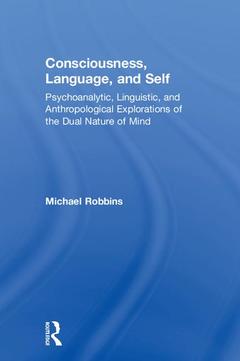Consciousness, Language, and Self Psychoanalytic, Linguistic, and Anthropological Explorations of the Dual Nature of Mind
Auteur : Robbins Michael

Consciousness, Language, and Self proposes that the human self is innately bilingual. Conscious mind includes two qualitatively distinct mental processes, each of which uses the same formal elements of language differently. The "mother tongue," the language of primordial consciousness, begins in utero and our second language, reflective symbolic thought, begins in infancy.
Michael Robbins describes the respective roles the two conscious mental processes and their particular use of language play in the course of normal and pathological development, as well as the role the language of primordial consciousness plays in adult life in such phenomena as dreaming, infant-caregiver attachment, creativity, belief systems and their effects on social and political life, cultural differences, and psychosis. Examples include creative persons, extreme political figures and psychotic individuals. Five original essays, written by the author?s current and former patients, describe what they learned about their aberrant uses of language and their origins.
This book sheds new light on several controversies that have been limited by the incorrect assumption that reflective representational thought and its language is the only conscious mental state. These include the debate within linguistics about whether language is the expression of a hardwired instinct whose identifying feature is recursion; within psychoanalysis about the nature of conscious and unconscious mental processes, and within cognitive philosophy about whether language and thought are isomorphic.
Consciousness, Language, and Self will be of great value to psychoanalysts, as well as students and scholars of linguistics, cognitive philosophy and cultural anthropology.
Preface; Introduction: The lay of the land; Chapter 1 Language and the sense of self Chapter 2: Two conscious mental processes and their languages Chapter 3: Theoretical background of the problem of mental process and consciousness Chapter 4: Fundamental manifestations of primordial consciousness: dreaming and the languages of mother-infant bonding Chapter 5: The relation of mental process and language: The controversy within linguistics Chapter 6: The relationship of language to thought and the sense of self Chapter 7: Belief systems and other everyday phenomenology of primordial consciousness and its language Chapter 8: Primordial consciousness, language, and cultural differences Chapter 9: Emergence of the bilingual sense of self during the attachment phase Chapter 10: What characterizes language aberration? Chapter 11: Language aberration in relation to pathology of early attachment Chapter 12: Clinical methodology and data/Patient essays Chapter 13: Caroline: Schizophrenese Chapter 14: Jane Chapter 15: Charles Chapter 16: Lisabeth Chapter 17: Jacob Chapter 18: Our languages and our selves: Discussion and conclusion
Michael Robbins is a psychoanalyst and was formerly professor of clinical psychiatry at Harvard Medical School and the University of California San Francisco. He is a member of the American and International Psychoanalytic Associations. His previous books include Experiences of Schizophrenia, Conceiving of Personality, and The Primordial Mind in Health and Illness: A Cross-Cultural Perspective.
Date de parution : 04-2018
15.6x23.4 cm
Disponible chez l'éditeur (délai d'approvisionnement : 14 jours).
Prix indicatif 209,69 €
Ajouter au panierDate de parution : 04-2018
15.6x23.4 cm
Thème de Consciousness, Language, and Self :
Mots-clés :
Breathing Sounds; Primordial Consciousness; Psychoanalysis; Primordial Mental Activity; language; Constant Physical Activity; thought; Reflective Representational Thought; bilingual; Sociocentric Cultures; self; Charles’s Father; psychosis; Dynamic Systemic Analysis; Early Mother Infant Attachment; phenomenology; Socio-centric Cultures; culture; Psychotic Personality Organization; attachment; Rem Sleep; Aberrant Language; Conscious Mental Activity; Language Aberration; Idiographic Data; Pseudo Language; Attachment Phase; Larger Gray Matter Volume; Daily Parade; Jane’s Language; Boston Change Process Study Group; Undifferentiated Matrix; Somatic Sensations; Universal Grammar Hypothesis



